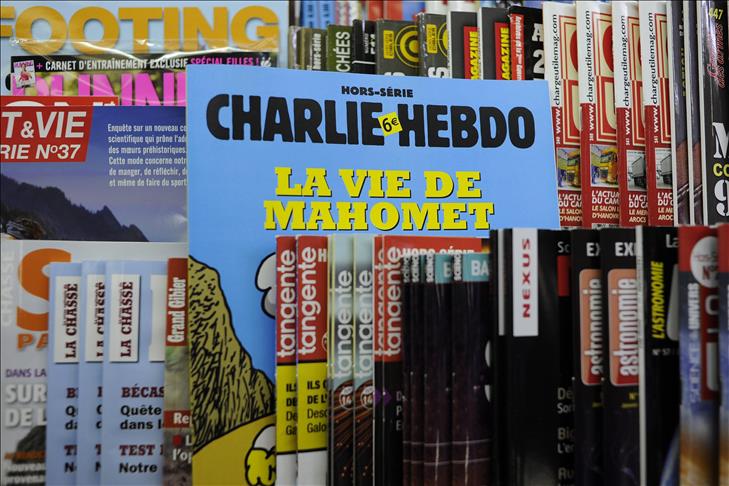
By Tommy Hansen
COPENHAGEN
Danish newspaper Jyllands-Posten, which sparked controversy around the world when it first published caricatures of the Prophet Mohammed in 2005, was the only major Danish newspaper not to carry illustrations from the Charlie Hebdo a day after the gun massacre at the French weekly's Paris headquarters.
Most leading Danish newspapers reprinted a series of cartoons from the satirical magazine on Thursday, in a show of solidarity with the staff at Charlie Hebdo and to show their support for freedom of speech.
The Danish daily Politiken reprinted a drawing of the Prophet Mohammad, promising; “100 whiplashes if people don't die of laughter”.
Another drawing included a sketch of Syrian President Bashar al-Assad, dressed as a Tour de France winner and described as "King of the Mountains, standing in front of a huge pile of dead bodies, accompanied by the text “Assad. 100,000 now dead".
A drawing of ousted Egyptian President Mohamed Morsi was also published accompanied by the text “Morsi removed. Not smart to be against weddings for everybody”.
Information ran the headline: Nous sommes tous Charlie Hebdo (We are all Charlie Hebdo), while the Ekstra Bladet changed the name of Thursday's issue to Charlie Hedbo, written in Ekstra Bladet's normal font.
'Direct attack'
But the Jyllands-Posten's front page was pure black and avoided printing any cartoons, instead quoting lines from its editorial inside, referring to “the free world’s common project to protect our democratic society”.
The newspaper's editor, Jørn Mikkelsen, said in a commentary: "This same debate has been going on now for 10 years, for or against the drawings and so on."
"We must move on."
The newspaper ran news coverage of the attack on the Charlie Hebdo offices, in which an armed gang slaughtered 12 people, including some of France's best-loved satirical cartoonists and journalists, as well as two police officers.
But Politiken editor-in-chief Bo Lidegaard, whose newspaper ran the Prophet Mohammed caricatures, said: "The values upon which our society is founded include the freedom of speech, and we see the attack on Charlie Hebdo as a direct attack against this foundation."
Danish Peace researcher Jan Øberg, from the independent think-tank the Transnational Foundation for Peace and Future Research, TFF, called for a different approach.
He said: "Before the Western world now transfers itself into a renewed terror-threat mode, we should stop and think for a moment."
"Is this really an attack on Western liberties, or is it revenge for what by some is regarded as blasphemy?"
'Deeply insulting'
Øberg added: "Whether we agree or not, we know that 1.6 billion Muslims around the world find it deeply insulting whenever we taunt and picture the prophet Mohammad.
"So why is it so important for us to stand on our right to do so?" he asked.
He went on: "It is an exaggeration and a simplification to, within hours, transform a terror attack with 12 people dead into a deliberate strategic attack on the Western civilization."
"Even before any perpetrator has made claims or statements about the reasons, the Western media apparently have figured it out themselves, which then - via our politicians - maintain the feeling that we are at war with the Muslim world."
The Union of Danish Muslims - Dansk Muslimsk Union (DMU) - denounced the attack in Paris, describing it as a form of “madness represented by the perpetrators”.
Danish Prime Minister Helle Thorning-Schmidt also condemned the attack.
Worldwide protests
Jyllands-Posten said it was stepping up security on its two headquarters in Aarhus and also Copenhagen, where the offices of newspapers Politiken and Ekstra Bladet were also housed, following the Charlie Hebdo massacre.
The Jyllands-Posten cartoons crisis began after it printed 12 editorial cartoons depicting the Islamic prophet Mohammad in an article entitled “The face of Mohammad” published on Sept. 30, 2005. More than hundred people were killed in Muslim countries during the riots sparked by the publication.
The newspaper claimed the publication was an attempt to contribute to the debate about criticism of Islam and self-censorship.
But Muslim groups in Denmark complained, and the issue led to worldwide protests and violence as well as riots in some Muslim countries.
The Mohammad drawings were then reprinted in French Charlie Hebdo in February 2006 in solidarity with Jyllands-Posten, sparking further anger and threats by radical Islamists.
The Danish security and intelligence service PET said in a statement on Thursday that it was monitoring the situation carefully but it had not currently changed its assessments of the level of "terrorism threat" against Denmark.
Anadolu Agency website contains only a portion of the news stories offered to subscribers in the AA News Broadcasting System (HAS), and in summarized form. Please contact us for subscription options.







